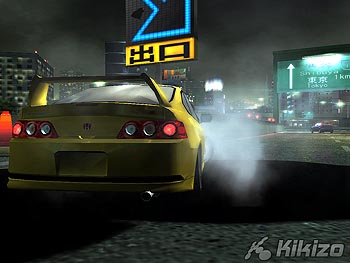Fast and the Furious: Tokyo Drift
Eutechnyx takes on the street racing genre.
| Version PS2 | Developer Eutechnyx | Publisher Namco Bandai (US) EA (Europe) | Genre Racing |
||||
Well this is one to file cleanly in the 'a bit pointless' cabinet - whilst this is a Namco Bandai/Eutechnyx release, Fast and the Furious: Tokyo Drift is published by EA in Europe. This is the same EA that creates their own versions of the souped-up street racing games in the Need For Speed series.

The release of an identikit game, just with a licence, is an odd choice, that's for sure. Especially when the new release is so clearly influenced by the series EA already releases. Some could even call it moneygrabbing. Not me, obviously. I'd never do a thing like that.
If you've played NFS: Carbon, you know what to expect. You really, really do. To a daft degree. The street-racing format remains essentially the same as the multi-million selling series', with players starting off with little money and a poor-to-reasonably good car. Do it up as you see fit, attach turbo boosters to the wing mirrors, fit cola cubes instead of wheels - that kind of thing.
"Those who want street racing thrills should stick with Carbon, Midnight Club, Juiced or whatever else there is these days."
|
Tokyo Drift isn't very good at all, really. The movie licence whores out there will lap it up, clearly, but those who want better street racing thrills should stick with Carbon, Midnight Club, Juiced or whatever else there is these days. They do it better. Simple as that. There are just one too many things in Tokyo Drift that drag it down in to the realms of obscurity - the dark, muddy looks aren't atmospheric in the slightest, the (albeit eclectic) musical selection is unmemorable at best.
And don't get me started on the shaky-hand cam that plagues the entire game, even when travelling at 32MPH. It doesn't add a sense of speed or urgency, nor does it add any thrills, it just annoys. The game engine doesn't hold up well under pressure, and often flip flaps from smooth muddiness to one-frame-per-second muddiness when you decide to turn your car. Not helpful.
The racing comes in a few forms - from the boredom of point to point, including the so-called 'excitement' of top speed challenges, and the annoying roll up challenges - amongst others - but nothing really gets the adrenaline going. Not for the right reasons, anyway; certain roll up challenges (instigated by a flash of the headlights and starting immediately) can be intensely infuriating, as the computer ranges from godawful to so ridiculously perfect you want to rip your eyes out and fit nitrous in the bleeding sockets instead, and there is no real indication of how good they will actually be until you begin the race.
Doing up a car is always a thrilling experience, and in Tokyo Drift it's no different - you save your money, press some buttons and BAM! Your car goes a bit faster/handles better/has more powerful nitrous. Seen. It. All. Before. Even the drifting system, which is meant to be as revolutionary as the wheel itself, is a case of driving aids and a momentum meter at the bottom of the screen - both of which I know I've seen in other games in the past.
And that's the main problem with the Fast and the Furious, bar the array of technical and gameplay faults - it's been done a dozen times before over the last few years, and has been done a hell of a lot better. The film series may have helped kickstart a popular trend, but the game is far too little, far too late.
| ||||||||||||
|











 Satoru Iwata Video Interview - the late Nintendo president spoke with Kikizo in 2004 as 'Nintendo Revolution' loomed.
Satoru Iwata Video Interview - the late Nintendo president spoke with Kikizo in 2004 as 'Nintendo Revolution' loomed. Kaz Hirai Video Interview - the first of Kikizo's interviews with the man who went on to become global head of Sony.
Kaz Hirai Video Interview - the first of Kikizo's interviews with the man who went on to become global head of Sony. Ed Fries Video Interview - one of Xbox's founders discusses an epic journey from Excel to Xbox.
Ed Fries Video Interview - one of Xbox's founders discusses an epic journey from Excel to Xbox. Yu Suzuki, the Kikizo Interview - we spend time with one of gaming's most revered creators.
Yu Suzuki, the Kikizo Interview - we spend time with one of gaming's most revered creators. Tetris - The Making of an Icon: Alexey Pajitnov and Henk Rogers reveal the fascinating story behind Tetris
Tetris - The Making of an Icon: Alexey Pajitnov and Henk Rogers reveal the fascinating story behind Tetris Rare founders, Chris and Tim Stamper - their only interview? Genuinely 'rare' sit down with founders of the legendary studio.
Rare founders, Chris and Tim Stamper - their only interview? Genuinely 'rare' sit down with founders of the legendary studio. The History of First-Person Shooters - a retrospective, from Maze War to Modern Warfare
The History of First-Person Shooters - a retrospective, from Maze War to Modern Warfare